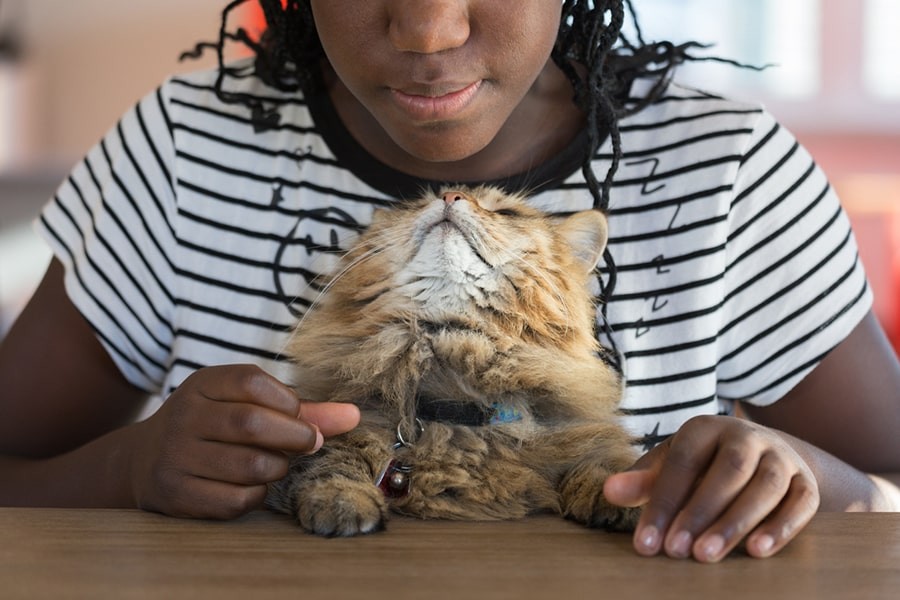Are you curious about mixed-breed dogs? WHAT.EDU.VN explores the unique qualities and advantages of owning a mutt, offering insights into their health, temperament, and why they make wonderful companions. Discover the charm of these lovable canines and learn why embracing a mutt can be a rewarding experience. If you have questions about the best ways to care for your mixed breed dog, or simply want to know more about how to keep it happy and healthy, ask our experts at WHAT.EDU.VN today for free pet advice.
1. What Is A Mutt?
A mutt, also affectionately known as a mixed breed or mongrel, is a canine whose ancestry comprises various breeds, often of unknown origin. Unlike purebred dogs with traceable lineages, mutts boast a genetic tapestry woven from diverse backgrounds. These delightful canines possess a distinct charm arising from their unique blend of physical traits and temperaments. Mutts have unique appearances and personalities.
2. Debunking the “Mutt” Misconception
Historically, the term “mutt” carried a somewhat negative connotation, implying inferiority or lack of pedigree. However, modern perspectives celebrate mutts for their resilience, adaptability, and unique charm. Many owners prefer the term “mixed breed” to describe their beloved companions, acknowledging the diverse genetic heritage that contributes to their individuality.
3. Tracing the Mutt Lineage: A Genetic Mystery
The lineage of a mutt often remains shrouded in mystery, with identifiable purebred ancestors being the exception rather than the rule. Speculation about their breed mix is common, but accurate determination can be challenging without genetic testing. This element of surprise adds to the allure of owning a mutt, as their physical and behavioral traits can be wonderfully unpredictable.
4. Mutt Characteristics: A Kaleidoscope of Traits
Mutts defy categorization due to their diverse genetic makeup. Size, shape, color, coat pattern, and temperament vary widely, reflecting the influence of their ancestral breeds. A mutt might sport a long snout, perky ears, a stubby tail, or a patchwork of colors, making each one a truly unique masterpiece of canine genetics.
5. Mutts vs. Purebreds: A Comparative Analysis
Understanding the distinctions between mutts and purebreds is essential for prospective dog owners. Purebreds adhere to specific breed standards, with consistent physical and temperamental traits. Mutts, on the other hand, offer a delightful blend of characteristics, often exhibiting hybrid vigor and enhanced resilience to certain genetic ailments.
6. The Purebred Pedigree: A Legacy of Consistency
Purebred dogs trace their ancestry back to recognized breeds with established standards. Breeders meticulously select parent dogs to preserve desired traits, ensuring uniformity in appearance and temperament. While pedigree dogs possess a certain prestige, their genetic homogeneity can predispose them to specific health issues.
7. Mutt Advantages: Genetic Diversity and Resilience
Mutts benefit from a broader genetic pool, reducing the likelihood of inheriting breed-specific diseases. This genetic diversity often translates to enhanced immune function and increased resistance to common canine ailments. The cost of owning a mutt can also be significantly lower, with reduced veterinary expenses and lower adoption fees.
8. Crossbreeds and Designer Dogs: A Hybrid Approach
Crossbreeds, also known as designer dogs, result from intentionally mating two different purebreds to combine desirable traits. Popular examples include Labradoodles (Labrador Retriever + Poodle) and Goldendoodles (Golden Retriever + Poodle). While crossbreeds can offer predictable characteristics, their genetic makeup remains variable, and they may inherit undesirable traits from either parent breed.
9. Designer Dog Considerations: Temperament and Health
While designer dogs enjoy popularity, prospective owners should exercise caution and thoroughly research the parent breeds involved. Temperament and health issues can vary significantly, and ethical breeders prioritize genetic testing to minimize the risk of inherited diseases.
10. Mutt Care: Meeting Their Unique Needs
Caring for a mutt requires the same dedication and attention as any other dog breed. Regular exercise, a balanced diet, routine veterinary check-ups, and plenty of affection are essential for their well-being. Understanding their individual needs and providing a nurturing environment will help them thrive. Remember to consult with your veterinarian and/or a dog trainer who can assess a mutt’s exercise needs based on their size, athleticism, and coat type.
11. Nutritional Needs: A Balanced Diet for Optimal Health
A balanced diet is crucial for maintaining a mutt’s health and vitality. Obesity is a common concern in dogs, so portion control and limited treats are essential. Consult with your veterinarian to determine the appropriate food and feeding schedule for your mutt’s specific needs.
12. Grooming Essentials: Maintaining a Healthy Coat
Regular grooming is essential for maintaining a mutt’s coat health and hygiene. Brushing at least once a week helps remove loose hair and prevent matting. Long-haired mutts may require more frequent grooming to prevent tangles and maintain a healthy coat.
13. The Mutt Advantage: Lower Costs and Healthier Lives
Owning a mutt often translates to significant cost savings. Adoption fees are typically lower than purchasing a purebred puppy, and mutts tend to have fewer health issues, resulting in reduced veterinary expenses. Their genetic diversity contributes to a stronger immune system and a longer lifespan, making them a cost-effective and rewarding pet.
14. Mutt Health: Genetic Resilience and Longevity
Mutts possess a genetic advantage due to heterosis, which enhances their overall health and vigor. Purebred dogs are more prone to breed-specific diseases, while mutts benefit from a diverse gene pool, reducing their susceptibility to inherited ailments.
15. Breed-Specific Ailments: Understanding the Risks
Purebred dogs are often predisposed to certain health conditions due to selective breeding practices. English Cocker Spaniels, for example, are prone to eye issues, bleeding disorders, deafness, and allergies. Brachycephalic breeds like Pugs are susceptible to respiratory problems due to their shortened snouts.
16. Personality Traits: A Unique Blend of Temperaments
Mutts exhibit a wide range of personalities, reflecting the diverse influences of their ancestral breeds. They can be shy, goofy, intelligent, aloof, quiet, or boisterous. Early socialization and proper training are crucial for shaping their behavior and fostering a strong bond with their owners.
17. The Mutt Mission: Making a Difference in Shelters
Mutts are disproportionately represented in animal shelters, often overlooked in favor of purebreds. Adopting a mutt from a shelter provides a loving home for a deserving animal and helps reduce the demand for puppy mill dogs and unethical breeding practices.
18. Mutt Adoption: Saving Lives and Supporting a Cause
Adopting a mutt from a shelter saves a life and supports a worthy cause. You are providing a home for a dog in need and freeing up resources for other homeless animals. Mutt adoption also sends a message against the “pets for profit” mentality, promoting ethical and responsible pet ownership.
19. Beyond Breed: Personality and Compatibility
While breed can provide insights into potential traits, personality and compatibility are more critical factors in long-term harmony. Selecting a dog whose energy level and temperament align with your lifestyle is essential for a fulfilling relationship.
20. Mutt DNA Testing: Unveiling the Genetic Tapestry
If you’re curious about your mutt’s ancestry, a pet DNA test can provide valuable insights into their breed mix. While the results may be fascinating, remember that love, companionship, and shared experiences are what truly matter. If you are interested in learning about the costs and benefits of dog DNA testing, ask our community at WHAT.EDU.VN.
21. Strays: A Unique Adoption Consideration
Taking in a stray cat is incredibly rewarding. Understanding how to socialize the cat with the other animals in the household is the key to success. A stray cat may require additional veterinary care, so be aware of this before welcoming a new cat into your home.
22. Cat Pneumonia: Causes, Signs, and Treatment
Learn how to tell if your cat has pneumonia and what to do about it. Cat pneumonia is a serious condition and requires immediate care.
23. Epilepsy in Dogs: An Overview
Get insights into seizures, why they happen, how they’re diagnosed, and treatment options. A dog with epilepsy can still live a happy life.
24. Embrace the Mutt Magic: A Lifetime of Love
Mutts offer a unique blend of charm, resilience, and affordability, making them exceptional companions for individuals and families alike. By embracing a mutt, you are not only gaining a loving pet but also supporting a worthy cause and celebrating the beauty of genetic diversity. If you have questions about mutt ownership, need help with behavioral training or have a question about their history, ask our experts at WHAT.EDU.VN today.
FAQ About Mutts
| Question | Answer |
|---|---|
| What exactly defines a “mutt?” | A mutt, or mixed breed, is a dog with ancestry from multiple breeds, often unknown. They’re not purebred and possess a unique mix of traits. |
| Is “mutt” a derogatory term? | Historically, it could be negative, implying inferiority. Today, “mixed breed” is preferred by some, but “mutt” is often used affectionately to describe a dog with mixed heritage. |
| How can I find out what breeds are in my mutt? | A pet DNA test can reveal your mutt’s breed composition. However, remember that personality and compatibility are more important than knowing their exact ancestry. |
| Are mutts healthier than purebreds? | Generally, yes. Mutts benefit from a wider gene pool, reducing their risk of inheriting breed-specific diseases. This is known as “hybrid vigor.” |
| Do mutts have specific care requirements? | Not typically. Care is based on individual needs, considering size, energy level, and coat type. Regular exercise, a balanced diet, and routine vet check-ups are essential. |
| Are mutts more difficult to train? | Not necessarily. Intelligence and trainability vary by individual dog, not breed. Early socialization and positive reinforcement methods are key to successful training. |
| Are mutts good family dogs? | Many mutts make excellent family pets due to their adaptable nature and diverse temperaments. Early socialization with children is important. |
| Where can I adopt a mutt? | Animal shelters and rescue organizations are excellent places to find mutts in need of loving homes. |
| Are mutts more affordable than purebreds? | Generally, yes. Adoption fees are usually lower, and mutts may have fewer health issues, leading to reduced veterinary expenses. |
| Why should I consider adopting a mutt? | You’ll be saving a life, supporting a worthy cause, and gaining a unique and loving companion. Mutts often possess the best traits of various breeds, making them wonderful additions to any family. |




Unleash Your Curiosity: Ask Your Pet Questions Freely at WHAT.EDU.VN
Do you have burning questions about your mixed-breed dog? Are you seeking expert advice on training, nutrition, or healthcare? Look no further than WHAT.EDU.VN, your go-to resource for free, reliable, and personalized answers to all your pet-related inquiries.
At WHAT.EDU.VN, we understand the joys and challenges of pet ownership. That’s why we’ve created a platform where you can connect with knowledgeable professionals and passionate pet lovers who are eager to share their expertise. Whether you’re a seasoned pet parent or a first-time owner, our community is here to support you every step of the way.
Why Choose WHAT.EDU.VN?
- Free Answers: Get your questions answered without any hidden fees or subscriptions.
- Expert Advice: Connect with veterinarians, trainers, and experienced pet owners.
- Personalized Guidance: Receive tailored recommendations based on your pet’s specific needs.
- Supportive Community: Join a vibrant community of pet lovers who share your passion.
- Convenient Access: Access our platform anytime, anywhere, from your computer or mobile device.
Ready to Get Started?
- Visit WHAT.EDU.VN today.
- Post your question in our user-friendly forum.
- Receive prompt and helpful answers from our community of experts.
Don’t let your pet questions go unanswered. Join WHAT.EDU.VN today and unlock a world of knowledge and support for your beloved companion.
Contact Us:
- Address: 888 Question City Plaza, Seattle, WA 98101, United States
- WhatsApp: +1 (206) 555-7890
- Website: what.edu.vn
Disclaimer: The information provided on WHAT.EDU.VN is intended for educational and informational purposes only and does not constitute professional veterinary advice. Always consult with a qualified veterinarian for any health concerns or before making any decisions related to your pet’s care.